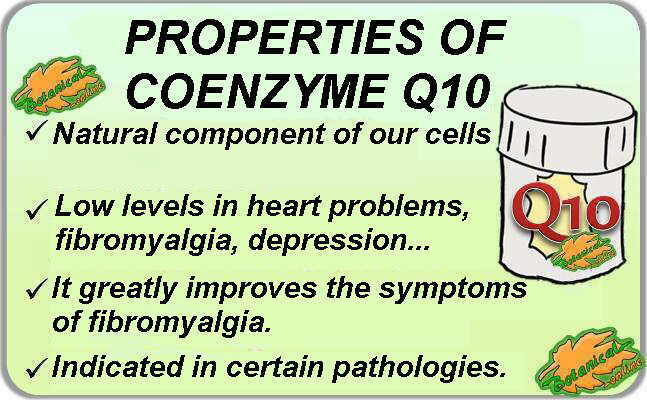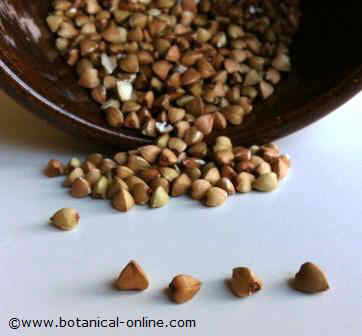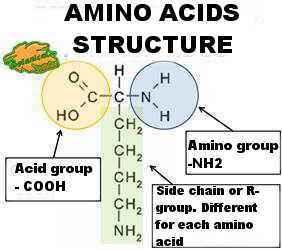Contents
- 1 Medicinal benefits of coenzyme Q10
- 1.1 PROPERTIES OF COENZYME Q10
- 1.2 Therapeutic uses of coenzyme Q10
- 1.3 What is coenzyme Q10 used for?
- 1.4 Coenzyme Q10 for heart problems
- 1.5 Coenzyme Q10 for arterial hypertension
- 1.6 Coenzyme Q10 for cholesterol
- 1.7 Other diseases that can be treated with coenzyme Q10
- 1.8 Other possible therapeutic uses of coenzyme Q10
- 1.9 How to take supplements of coenzyme Q10
Medicinal benefits of coenzyme Q10
PROPERTIES OF COENZYME Q10
Therapeutic uses of coenzyme Q10
Coenzyme Q10 should be used as a complement to traditional medicines so it is necessary to consult with the doctor about its possible use.
At no time should you abandon the official medication or replace it completely with this supplement without the consent of the doctor or specialist.
What is coenzyme Q10 used for?
From the therapeutic point of view, coenzyme Q10 is used for the following purposes:
Coenzyme Q10 for heart problems

Coenzyme Q10 is very used to prevent or treat heart problems
Numerous studies have shown the effectiveness of this supplement for heart diseases.
The reason for this ability to aid in the work of the heart is due to the fact that the heart muscle cells are those that contain a greater number of mitochondria that are charged through coenzyme Q10 to produce the energy that makes the heart beat.
It has been proven that people with heart problems usually have a very low Q10 coenzyme level, so people who show heart problems often get much better when they are given coenzyme Q10 supplements.
Its use has been particularly positive in the treatment of congestive heart failure. In Italy, a study was carried out on 2500 patients with this weak heart disease. All of them were given daily an amount of 100 mg daily for 90 days. 80% of patients experienced an improvement after this treatment, with a decrease in the negative symptoms of this disease (lower degree of insomnia, decreased fluid retention in the feet and legs, decreased respiratory problems, etc. ) (The recommended dose is currently 100 mg daily divided into 2 or 3 doses)
Likewise, its use has been positive in patients who have suffered a myocardial infarction. Patients who take this supplement for 12 months after the heart attack are less likely to have other new heart attacks. (The recommended dose in this case is 120 mg daily divided into two doses) This same treatment is appropriate in case of arrhythmias and atherosclerosis.
Although there is no conclusive evidence, many angina patients recognize that ingesting this supplement in doses of 100 mg daily divided into 2 doses reduces pain and improves adverse reactions against exercise.
Without conclusive evidence, the use of this supplement in the indicated doses seems to have a positive effect in the treatment of Raynaud’s disease. Raynaud’s disease produces poor circulation in the limbs with fingers and toes that turn purple or whitish, especially with cold.
Coenzyme Q10 for arterial hypertension
Coenzyme Q10 supplementation has been successful in the treatment of high blood pressure (essential hypertension) Its use allows to reduce the proportion of conventional medication or to alternate this treatment with conventional medicines.
It has also been shown to be effective in those cases in which it is known as isolated systolic hypertension. The use of this supplement is also very suitable to reduce the side effects of beta-blockers, a type of medication used to treat hypertension.
It is believed that this improvement is due to the fact that coenzyme Q10 improves the conditions of the heart muscle, increasing blood pumping and, as a consequence, blood pressure decreases.
However, the blood pressure values should be measured usually because the use of this supplement together with other medicines to lower blood pressure could reduce the levels too much.
The usual dose for high blood pressure in general is 120 to 200 mg daily divided into two doses) (In case that only the measure of “high blood pressure” is that which appears high, a dose of 60 mg divided daily will suffice in two shots)
Coenzyme Q10 for cholesterol
The oxidation of cholesterol is responsible for the formation of clots that can clog the arteries, favoring the onset of cardiovascular diseases, such as heart attacks or strokes. The use of this antioxidant supplement can prevent the negative effects of oxygen on cholesterol.
On the other hand, the use of this supplement could be appropriate in people who take cholesterol medications, given that many of these drugs block not only cholesterol but the formation of coenzyme Q10.
Other diseases that can be treated with coenzyme Q10

Coenzyme Q10 is very used to treat fibromyalgia
- Coenzyme Q10 deficiency: responsible for the onset of symptoms such as seizures or fatigue. It is a very unusual type of deficiency.
- Parkinson’s disease: Its use is very effective in the treatment of Parkinson’s disease in the early stages, although it seems that it does not show efficacy when the disease is declared.
- Other degenerative nervous diseases: Numerous studies are being carried out to verify the effectiveness of this coenzyme in the treatment of other nervous degenerative diseases such as Alzheimer’s and fibromyalgia.
- Migraine: It is suitable for the prevention of headache or migraine, as long as it has not already manifested (the usual dose is usually 300 mg daily divided into 3 doses).
- Mitochondrial disorders: These are those that affect the mitochondria, which are part of the cells that are responsible for the production of energy. These disorders are responsible for the appearance of a series of symptoms, such as fatigue, blindness, gastrointestinal problems, growth problems, etc. The prolonged use of coenzyme Q10 can improve these disorders (the usual dose is 150 to 160 mg day).
- Muscular dystrophy: Coenzyme Q10 improves the symptoms of muscular dystrophy, providing more strength to the muscle and decreasing muscle pain. (The usual dose is 100 mg daily)
- Treatment of AIDS: Coenzyme Q10 favors the immune system of AIDS patients. (The usual dose is usually 200 mg daily)
Other possible therapeutic uses of coenzyme Q10

Coenzyme Q10 has been attributed with anti-aging properties
Although more conclusive studies are required, coenzyme Q10 is used in other treatments such as:
- Infertility: Coenzyme Q10 could increase male fertility since it increases the number of sperm and they have a greater capacity for movement.
- Diabetes: According to some specialists, Coenzyme Q10 manages to stabilize the levels of glucose in the blood. Others do not show support for the administration of this supplement in cases of diabetes.
- Breast cancer: Some studies advance possible benefits in the treatment of breast cancer. Especially mentioned is the ability of this enzyme to reduce the toxicity of some chemotherapy treatments, especially when combined with other supplements such as omega3 and omega6 fatty acids.
- Aging: The antioxidant capacity of coenzyme Q10 has been used to stay young for longer.
- Increase physical performance in athletes and people in general: Although it is usually taken as a sports supplement, there is no evidence to demonstrate the effectiveness of this coenzyme in the greater physical performance in sports.
- Chronic fatigue syndrome: As in the previous case there is no conclusive evidence on this use.
- Baldness: It has been speculated that this supplement could prevent hair loss in people taking the drug warfarin to make blood more fluid.
- Muscle pain produced by statins: Statins are certain anticholesterol drugs that are attributed the cause of muscle pain. Some specialists think that coenzyme Q10 could be useful to reduce this type of pain.
- Allergy: We are studying the possibility that this supplement may reduce the symptoms of allergies.
- Preeclampsia: It is a type of abnormality during pregnancy characterized by an increase in blood pressure and protein in the blood. Some specialists believe that the administration of coenzyme Q10 from week 20 until delivery can reduce the risk of acquiring this anomaly.
- Weight loss diets: The ability to accelerate cell metabolism implies a greater wear of ingested food and a help, according to some experts, in weight loss diets.
How to take supplements of coenzyme Q10
Whether in the form of capsule, tablet, liquid or soft gelatin, it is best to take this supplement distributed at least a couple of times a day with meals.
Coenzyme Q10 is fat-soluble, that is to say, it dissolves with fat, so if it is taken during meals, its absorption is favored.
We must remember that this supplement should be taken a minimum of a couple of months to obtain the first results.
![]() More information on Coenzyme Q10.
More information on Coenzyme Q10.








